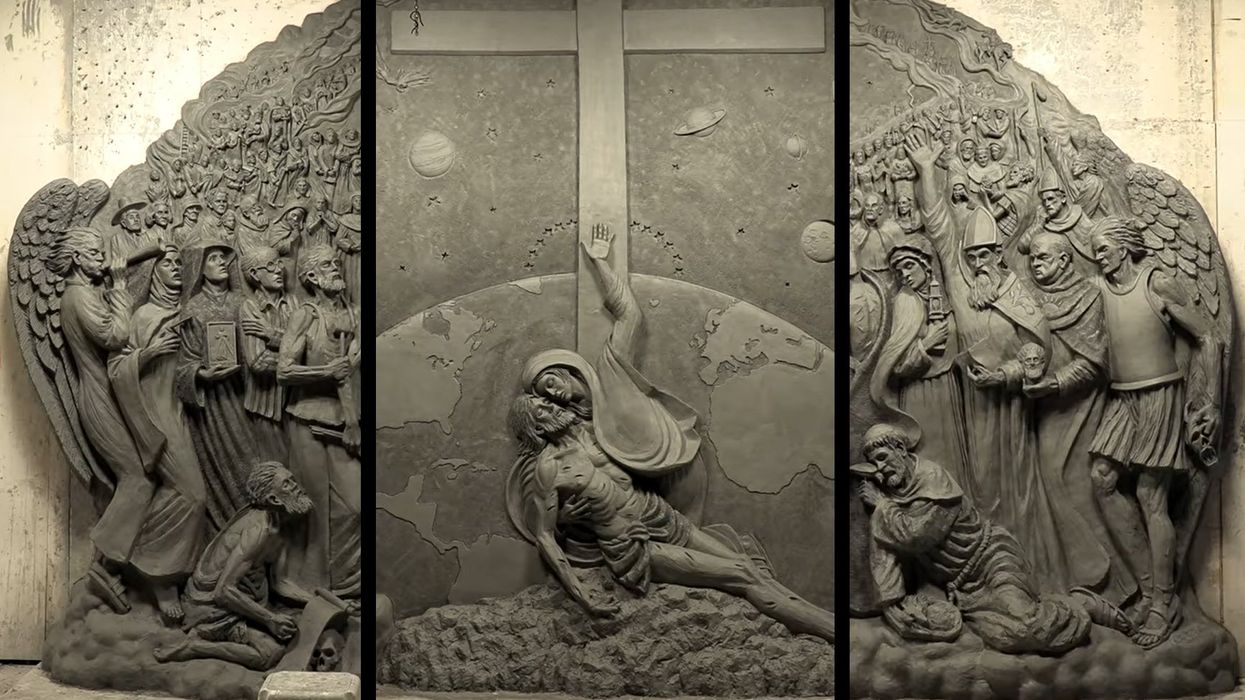© 2024 Blaze Media LLC. All rights reserved.
Tony Perkins: 'Jesus Rejected Collectivism' & Was a Free-Market Enthusiast
December 06, 2011
"To everyone who has, more shall be given."

Over the past few months, we've explored the faith community's reaction to Occupy Wall Street. The Christian left, among others, have insinuated since the movement began that Jesus Christ was a socialist, communist -- essentially an ultra-leftist.
Following the deluge of commentary from the Rev. Jim Wallis, among others, Family Research Council president Tony Perkins is coming out strong against the notion that Jesus would have forced redistributive policies on Americans (or on anyone, for that matter).

On the CNN's Belief Blog, Perkins writes about one of the last instructions that was given by Jesus to his disciples. In his piece, Perkins explains that Jesus told the disciples that the new kingdom God had promised would not be established immediately on earth. To deliver the message lightly, the Bible records a parable that Christ used. Perkins writes:
The primary purpose of the parable, which appears in the Gospel of Luke, was to make clear to his disciples that the kingdom of God would not be physically established on the earth for some time and that, until then, they were being entrusted with certain responsibilities.Jesus, depicted as a ruler in the story, would have to leave for a while as he traveled to a faraway place to receive authority to reign over the kingdom. In his absence, the disciples – depicted as servants – were to "occupy" until he returned.
Here's the direct quote from Luke: "He called his ten servants, and gave to them ten minas, one mina each (a mina today would be worth around $225), and he then told them to 'Occupy till I come.' " (Luke 19:13, King James Version)
Perkins then goes on to ask if Jesus' meaning of the word "Occupy" is the same as the version of the word being employed by those who stand opposed to Wall Street and the current capitalist system. He concludes that the meaning of the word in Jesus' account is very different the one embraced by the religious left (and the Occupy movement).
 According to Perkins, the meaning of "Occupy" as it stands in Greek (translated into old English) means "to be occupied with business." This definition, Perkins contends, is all about opportunity in life and leaving a legacy -- something that requires hard work and dedication.
According to Perkins, the meaning of "Occupy" as it stands in Greek (translated into old English) means "to be occupied with business." This definition, Perkins contends, is all about opportunity in life and leaving a legacy -- something that requires hard work and dedication.
It is here that the FRC leader says Jesus was using the free market system to make his point. He contends that Christ's purposeful choice shouldn't be overlooked. He continues:
When the nobleman returns, after being established as king – a stand-in for Jesus – he calls all his servants together to see what they had accomplished in his absence.The first servant reports a nice profit: 10 minas. While the story lacks specifics on whether he invested the money in a herd of sheep or a hedge fund, we do know that he made his gain by engaging in business transactions of some sort. He used a free market system to bring a tenfold return on investment. No doubt such a return took a lot of diligent, dedicated effort.
At this point, Perkins writes that the new king praises the servant and then rewards him with something that's even greater than what he was originally given -- control over ten cities. The second servant, too, who turned his one mina into five gets five cities in return. But the third servant who kept the money and didn't do anything with it angered the king and had little to show for his efforts (he didn't even collect interest on it.
"Out of your own mouth will I judge you, you wicked servant," the king said. Perkins writes that the king asked, "Why didn't you at least put the money in the bank and draw interest?" Essentially the lesson, as noted here, is: There aren't any excuses for failing to act. Perkins continues:
The ruler orders that the capital, or opportunity, given to the lazy servant be taken from him and given to the most productive servant. "To everyone who has, more shall be given," the Bible reads, "but from the one who does not have, even what he does have shall be taken away."Jesus rejected collectivism and the mentality that has occupied America for the last few decades: that everyone gets a trophy – equal outcomes for inequitable performance. There are winners and yes, there are losers. And wins and losses are determined by the diligence and determination of the individual.
You can read the rest of Perkins' words here and you can read the full parable on Bible Gateway here.
Want to leave a tip?
We answer to you. Help keep our content free of advertisers and big tech censorship by leaving a tip today.
Want to join the conversation?
Already a subscriber?
more stories
Sign up for the Blaze newsletter
By signing up, you agree to our Privacy Policy and Terms of Use, and agree to receive content that may sometimes include advertisements. You may opt out at any time.
© 2024 Blaze Media LLC. All rights reserved.
Get the stories that matter most delivered directly to your inbox.
By signing up, you agree to our Privacy Policy and Terms of Use, and agree to receive content that may sometimes include advertisements. You may opt out at any time.


